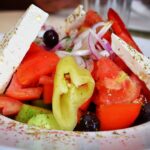There is a decades’ worth of research with conclusive evidence to support the link between cardiovascular health and the Mediterranean diet or more appropriately, the Mediterranean lifestyle. It’s actually more than just a diet or eating pattern – it’s a lifestyle! But what does this diet actually look like, why does it work, and how can we adopt it into our real lives?
What is a Mediterranean Diet?
The Mediterranean diet has been around for centuries, in fact, it was developed throughout the millennia by various civilizations across the Mediterranean region and now it has become a Mediterranean lifestyle that most health experts recommend. It’s not something new to be precise. The bulk of the diet consists of multi-colored fruits and vegetables, plus whole grains, legumes, nuts and seeds, fish and seafood, with olive oil and occasionally a glass of red wine. Olive oil is the main source of fat and other vegetable oils and butter is not used in preparing meals from this diet. There are also no refined grains like white bread, pasta, and rice, while red meat or processed meat is also almost excluded from this eating pattern.
As I’ve pointed out before, the Mediterranean diet should be called Mediterranean lifestyle because it is. This diet plan actually emphasizes on allowing people to sit down and enjoy their meals with family and friends, avoid eating too many snacks in between meals, and do enough physical activity to promote blood circulation and keep bodily functions at optimal levels.
The Mediterranean Lifestyle
The meals in this diet plan are like most other healthy diet where 40% of the food on a typical plate is plant-based. In reality, you are actually allowed to serve various meal types and not just Greek or Italian so as not to be stereotypical – the Mediterranean diet is broad in its recipes. Like I’ve said before, every plate should have fruits and vegetables as its base. Including grains in your plate should be selected from whole grain, like quinoa, brown rice, corn, farro, or whole wheat. You can substitute lean meat with plants such as legumes lentils, garbanzo, kidney, cannellini, or black beans to get protein.
In order to get a healthier source of fat, you need to use olive oil as well as nuts and seeds. You’re also encouraged to include fish and seafood in your diet; however, it’s not a pre-requisite. Dairy, poultry, and eggs should only be consumed in small and moderate amounts. Drinking a glass of wine each day is also beneficial, but you don’t have to drink regularly if you’re a non-drinker. As you can see, the Mediterranean lifestyle is rich in health-giving goodness and allows you to live life to the fullest in a simple way.
Why Does This Way of Eating Produce Such Impressive Health Benefits?
In a recent study published in JAMA Network Open, scientists examined the health records of more than 25,000 women who were over 45 years old (most of whom are 55) and with no history of cardiovascular disease. The researchers came up with a method to calculate a Mediterranean diet “score” by using the baseline dietary questionnaire. The scoring system works by giving 1 point for each of the 8 categories below:
- Higher than average intake of fruits
- Vegetables
- Whole grains
- Legumes
- Nuts
- Fish
- Healthy fats
- Healthy level of alcohol intake
- Lower than average intake of red and processed meats
The test subjects were divided into groups according to the amount of food intake from the Mediterranean diet (low, medium and high consumption with relative scores of 0 – 3, 4 – 5, and 6 – 9 respectively).
The research lasted for decades and the initial follow-up check was done after 12 years had passed, which showed about 1,030 participants developed fatal cardiovascular diseases such as heart attack, angina with stent placement, peripheral vascular disease requiring intervention, or stroke. On the other hand, the women who consumed medium and high Mediterranean diet showed a 23% and 28% lower risk of developing CVD, respectively. These figures would have had been higher if the participants were advised to live the Mediterranean lifestyle as well.
The women who had high Mediterranean diet scores also had lower body mass index (BMI) and blood pressure, as well as better laboratory results like lower inflammatory markers (high-sensitivity CRP), lower diabetes risk (insulin resistance), and a better lipid profile (higher HDL). These findings point to a clear conclusion, that the Mediterranean diet can benefit our body by reducing inflammation and promoting healthy blood cholesterol and sugar levels.
How to Transition from your Regular Diet to the Mediterranean Diet
Adopting the Mediterranean diet in our busy, high-tech world may seem daunting. However, you can find ways to go around this and all it takes is to start with your eating habits, which can reduce your risk of heart disease and prolong your life. You can follow these steps on how to change your eating habits into a healthier one. Taking one step at a time will get you far without even noticing it. This will be one of the best decisions in your life and you’ll all be for the better for it. Soon you’ll discover what it means to live a Mediterranean lifestyle.
Aim for Eight Servings of Fruits and Vegetables Per Day (4 to 5 cups)
Eight servings of fruits and vegetables could look like:
Breakfast: 1 cup of berries
Lunch: 2 cups of lettuce + 1/2 cup tomatoes + 1/2 cup cucumbers + an orange for dessert
If you wanted to get to 10 servings, then add:
Dinner: 1 cup broccoli + 1/2 cup diced peppers + 1/2 cup snow peas (in a stir fry)
Tips to Make the Habit Stick until you’ll Transition into the Mediterranean Lifestyle
- Start small, make 1 serving of fruits and/or vegetables in each meal or when you’ll prepare a snack, then add more as time goes by. You should be able to achieve 10 servings in just a few weeks’ time!
- It’s okay to buy fruits and vegetables that are frozen. You can get high quality berries, tropical fruits, and mixed vegetables from grocery stores that are cheaper than fresh ones and you can also buy them in bulk and store them in your own freezer and use them at a later time.
- When you prepare breakfast meals, make sure to make 2 or more servings of either fruits or vegetables. This gets the good stuff in early in the day. You can also include both.
- Download and install free meal tracker apps like MyFitnessPal or Dr. Michael Greger’s Daily Dozen to get the right meals on your plate, as well as the right amount of serving sizes. Enjoy the Mediterranean lifestyle with the meals and minimalist living.








One Response
Thanks for the auspicious writeup. It in reality used to be a leisure account it. Look advanced to far delivered agreeable from you! However, how can we keep in touch?